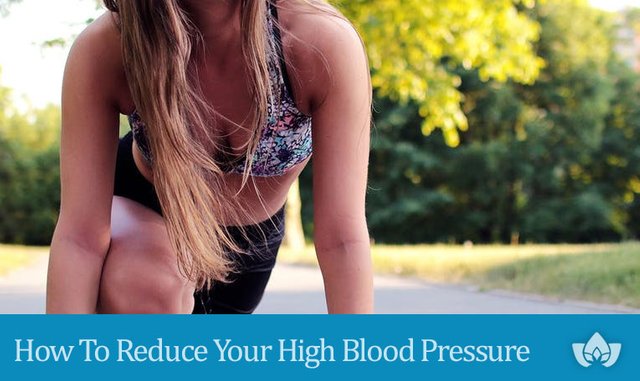
This article was written by Dr. Maria Cavallazzi, a naturopathic doctor at the Mindful Healing Integrative Naturopathy Clinic in Mississauga. It has been republished here on Steemit with the full permission of the original source.
If you’ve been diagnosed with high blood pressure, you may be surprised to find it’s one of the more common disorders facing people today.
As a naturopathic doctor in Mississauga, I’ve seen a number of patients over the years with this concern.
According to a Statistics Canada study from 2014, nearly 18% of Canadians age 12 and over have high blood pressure, and this trend seems to be on the rise.
So odds are becoming increasingly likely that you or a family member may struggle with high blood pressure.
But what causes it, and what can be done about it?
What Is High Blood Pressure?
Blood pressure is the way we measure how forcefully your blood pushes through the blood vessels in your body.
When a doctor checks your blood pressure, they will use two different numbers – your systolic blood pressure, and diastolic blood pressure.
Systolic is the pressure inside your arteries while they’re pumping blood, while your diastolic number measures the blood pressure of your arteries while your heart is resting between beats.
If you have healthy arteries, the blood will flow easily, at or near the ideal rate of between 90 and 120 systolic, and between 60 and 80 diastolic.
This makes things easier on your heart, since it doesn’t have to work as hard.
But if your arteries become clogged or stiff, it pushes your blood pressure up, which means your heart has to work harder than it normally would.
What Causes High Blood Pressure?
The truth is, we’re still in the process of understanding what causes high blood pressure. But there are many different factors which commonly contribute to it.
Generally, the way we treat high blood pressure is by using medication.
And while this medication can work, it often comes with a host of side effects, including dizziness, disrupted sleeping patterns, and erectile difficulties.
Fortunately, though, most people can reduce their blood pressure by making some lifestyle changes, avoiding these side effects.
Read on for a few tips on how to reduce your high blood pressure.
1: Stop Smoking And Cut Back On Drinking
It’s a well-known fact that your blood pressure increases while smoking a cigarette – this is specifically associated with nicotine, as opposed to one of the dozens of other harmful chemicals in a cigarette. That means you'll get this effect from chewing nicotine gum or using a patch to quit smoking as well.
Not that these things are bad, per se - anything to help you quit smoking is a good thing. But they're imperfect as permanent solutions and should only be used as a way to ease you out of your habit.
Interestingly, according to a study from P. Omvik of the University of Bergen School of Medicine in Norway, smokers tend to have a slightly lower average blood pressure than the rest of the population, but if your blood pressure is high in the first place, it may increase as you smoke a cigarette, putting undue strain on your heart.
Meanwhile, regularly consuming alcohol has a very specific causal relationship with an increase in blood pressure as well.
As a naturopathic doctor, I have to tell you that the ideal level of consumption of alcohol is zero. But if you don't want to do that, at least reducing your alcohol consumption can help.
2: Get Some Exercise
It may seem counter-intuitive.
Going for a bike ride, rowing, jogging, or doing some other form of cardiovascular exercise increases your heart rate at the time, which seems like it would increase your blood pressure.
But your heart is a muscle just like any other in your body.
And just like those bicep curls will strengthen your biceps, doing cardio will strengthen your heart.
This allows it to pump blood through your body more efficiently, put less strain on your blood vessels, and keeping the whole system healthier.
Pushing your body with exercise, then allowing it to rest and recover, helps keep your body’s various systems in check.
This includes your sympathetic and parasympathetic systems – the former which keeps you alert and aware, and the latter which is in charge of relaxation.
Keeping these two in harmony also helps keep your blood pressure in line too, so there’s an added benefit.

3: Eat Your Vegetables! (With Nitrates)
If you’ve ever followed diet trends, you’ll notice things come in and out of vogue.
Once upon a time fat was the enemy and now it’s on our team (at least some fats).
Eggs are sometimes good, sometimes bad.
Artificial sweeteners were once or friend and now the more health-conscious among us avoid them like the plague.
But there’s one thing that never goes out of style, and that’s your vegetables.
These provide all sorts of health benefits, and you should be including as many different vegetables as you can in your diet regardless of your blood pressure.
But if you do happen to have high blood pressure, they can help you tremendously.
And the way it works has something to do with nitrates.
If that sounds like the nasty stuff you find in processed meats, that's because it is similar sounding. But those are nitrites, not nitrates.
Nitrates are a naturally occurring substance found in just about all vegetables and fruits.
When you consume it, your body will convert it into nitric oxide.
As the nitric oxide flows through your veins, it will help relax, or dilate them, which makes the entire process of blood flow much easier on your body.
This results in a lower blood pressure.
While most vegetables have nitrates in them, here are some of the top nitrate-rich veggies out there.
- Arugula
- Celery
- Lettuce (particularly iceberg, butter leaf, or oak leaf)
- Beets and beet greens
- Spinach
- Cress
- Carrots
- Bok choy
- Rhubarb
- Swiss chard
- Turnips
Conclusion
Please note that none of the above advice should be a substitute for speaking with a qualified healthcare practitioner.
If you have been diagnosed with high blood pressure, or you believe you have it, contact Dr. Maria at the Mindful Healing Clinic.
You can find the original article on the Mindful Healing Clinic's website here
One of the first things I tell my family is to Get Up and Move
Sitting for long periods of time will raise BP, as well as increase the risk for disease. I stopped eating red meat a long time ago, and it decreased my BP. I do not know if there is any direct correlation on red meat and BP though. Great post!
Downvoting a post can decrease pending rewards and make it less visible. Common reasons:
Submit
Thanks!
There is some evidence that shows red meat can lead to high blood pressure, but as far as i know it's not conclusive.
Here's an interesting article for further research on the subject - https://www.ncbi.nlm.nih.gov/pubmed/25007430
Downvoting a post can decrease pending rewards and make it less visible. Common reasons:
Submit
Hi! I am a robot. I just upvoted you! I found similar content that readers might be interested in:
https://naturopathyformindandbody.wordpress.com/2017/11/15/what-causes-high-blood-pressure-and-how-to-reduce-it/
Downvoting a post can decrease pending rewards and make it less visible. Common reasons:
Submit